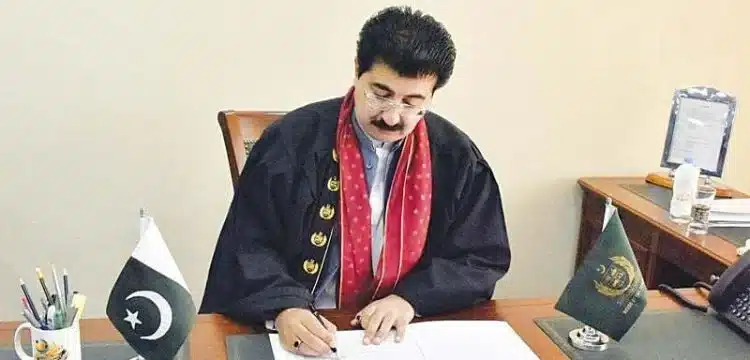[vc_row][vc_column][vc_column_text dp_text_size=”size-4″]After President Arif Alvi travelled for Saudi Arabia to perform the religious obligation of Hajj, Senate Chairman Sadiq Sanjrani took over as acting president on Sunday.
In the absence of the president from Pakistan for whatever reason, the chairman of the upper house of parliament takes his position as acting president, according to the Constitution.
Sanjrani took over the office in Quetta, and the Cabinet Division issued a notification to that effect.
Due to the death of his aunt, the Senate Chairman is currently in Balochistan’s capital.
Hajj is one of Islam’s five pillars and is observed for five days in the last month of the Islamic lunar calendar — Zil Hajj.
It is a religious requirement for all able-bodied Muslims who can afford it to do so at least once in their lives.
Who is Sadiq Sanjrani?
Sanjrani has the distinction of being the Senate’s youngest chairman, at 39 years old, and the first Balochistani to hold the position.
Sanjrani, who was born on April 14, 1978, in Nokkundi, Balochistan, took oath as Chairman of the Upper House on March 12, 2018, with 57 votes.
Previously, he served as a coordinator for previous Prime Minister Nawaz Sharif’s team in 1998-1999, and as a member of the Prime Minister’s Secretariat’s Grievance Cell from 2008 to 2013.
According to the Senate website, the first Senate chairman from Balochistan has a Master’s Degree in International Relations and a dynamic presence that combines professional acumen with humanitarian zeal.
In addition to chairing the Senate Finance Committee, the Business Advisory Committee, and the Committee for the Promotion and Development of Football in the Country, he had the highest political post in the Senate.
Sanjrani has served as a member of the Quetta Chamber of Commerce and Industry, ex-Director of the Board of Sheikh Khalifa Bin Zayed Hospital, Quetta, and founder-president of the Society for the Services of Humanity (SFSH), Islamabad, among other positions.
Sanjarani survived a no-confidence vote by the then-opposition in 2018, resulting in a surprising victory for the then-PTI-led government and coalition allies.
The opposition (now in government) had approved the no-confidence resolution by 64 votes, but although only needing 53 of the 64 senators to remove Sanjarni, the opposition fell three votes short.
This was the first time in Pakistani history that a no-confidence resolution was filed against the Senate chairperson, requesting his resignation. [/vc_column_text][/vc_column][/vc_row]











